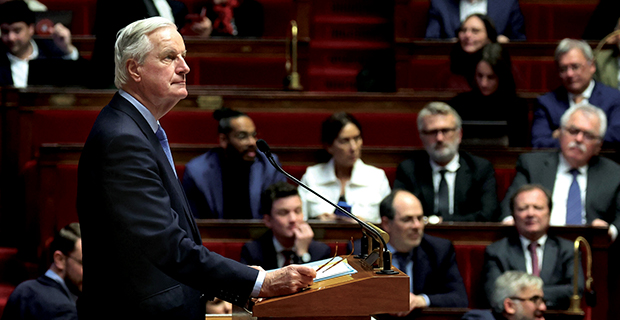Whither France?
New Delhi: France has been left without a government as in a first-of-its-kind move, the far-right and the left coalition joined hands to unseat Prime Minister Michel Barnier a day before his third month in power, propelling the country into a new phase of uncertainty with major and far-ranging implications for its politics and the economy.
As the National Assembly late in November passed the no-confidence motion against the government with 331 votes in the 577-member house with the leftist conglomeration New Popular Front joined by Marine Le Pen’s far-right National Rally, the consequences span far beyond the hapless Prime Minister’s political future.
The 73-year-old Barnier, who took over on September 5, will go down in history books twice. He is now the shortest-lived Prime Minister of the Fifth Republic (post-1958), with his 90-day-odd stint beating Premier Bernard Cazeneuve’s 160 days in 2016-17, and being just over a third of his predecessor Gabriel Attal’s 240 days. He is also the second Prime Minister to be unseated by a no-confidence vote - over half a century after Georges Pompidou in 1962.
The fall of Barnier’s centre-right government has left the Budget for the next year in limbo, but also raises questions over future governance, given the deadlock in the National Assembly, divided into three mutually antagonistic blocs spanning the political spectrum, but each far from a majority on their own.
Yet, the real victim is not Barnier, whose impassioned speech in the house failed to budge the National Rally nor did his concessions to their demands on the budget proposals, but President Emmanuel Macron, who has earned the undying enmity of both the right and the left with his series of reckless - in hindsight, mostly - political moves this year.
Following the vote, Marine Le Pen told the media that their decision to oppose the government - after staying out of the Left’s first no-confidence motion against Barnier in September - was carefully considered and meant “to protect the French people”. The reference was to the proposed budget, with its spending cuts and tax rises, as the deficit rises.
Jean-Luc Melenchon, the leader of NPF’s largest party France Unbowed, said that the outcome was “inevitable” and called for Macron’s resignation. However, Macron, who is midway through his second and final term, has time and again announced he will not quit. The options before the President are now to appoint a new Prime Minister and reports indicate that Macron, who returned from a visit to Saudi Arabia, has initiated the process. He could install a non-political government of technocrats, as has been the norm in neighbouring Italy, beset by chaotic politics and fractured mandates, but this lacks political legitimacy and will find it difficult to operate in the current polarised milieu.
Fresh parliamentary elections could be a way out, but this option is foreclosed by the constitution till next July. Yet, more than the politics, it is the economic situation that should concern the political stakeholders and the people, as the growing budget deficit, currently above 6 percent of the GDP, is swelling the public debt (beyond 3.2 trillion euros), and making it costlier and costlier to finance.
This, eventually, impacts the government’s capacity to act, amid the less-than-optimum climate in Europe, and the spending cuts and raised taxes goes on to fuel the rise of populist forces. France has already experienced this with the growth of both the far-right and the hard left at the experience of the centrist parties. The political imbroglio in France gains more significance as it is echoed in neighbouring Germany, where Chancellor Olaf Scholz’s “traffic light” coalition has broken down after the expulsion of the Free Democratic Party, leaving his government in a minority.
Elections are due early 2025 - at least half a year before schedule, and while the right-wing Christian Democratic Union is expected to beat Scholz’s Social Democratic Party, the rise of the right-wing Alternative for Germany and the left-wing but socially traditional Sahra Wagenknecht Alliance is fragmenting the political space - again at the expense of the centrists.
What would be more worrisome is that these extreme - by virtue of their position on the political spectrum - and populist parties have a disdain for the European Union, and its policies, especially on immigration. There are also not big fans of the EU views on Ukraine and sanctions against Russia - which are hitting Germany and other European countries more than the government of President Vladimir Putin.
With the political deadlock in both France and Germany - the EU and Europe’s biggest powers and economies amid wide-ranging global changes - the thumping victory and the coming presidency of Donald Trump, 2025 seemed destined to be quite eventful.











Comments.